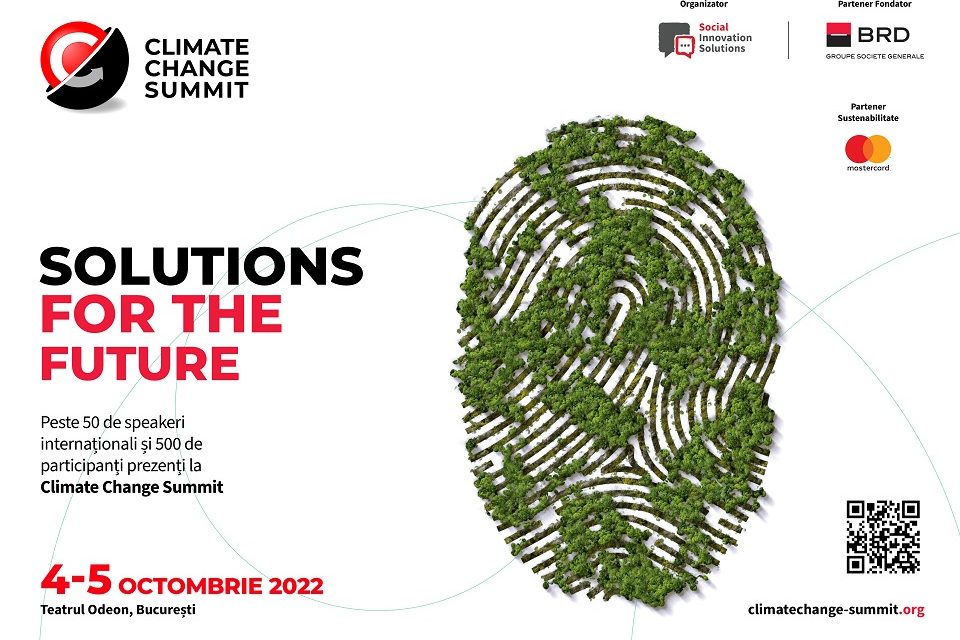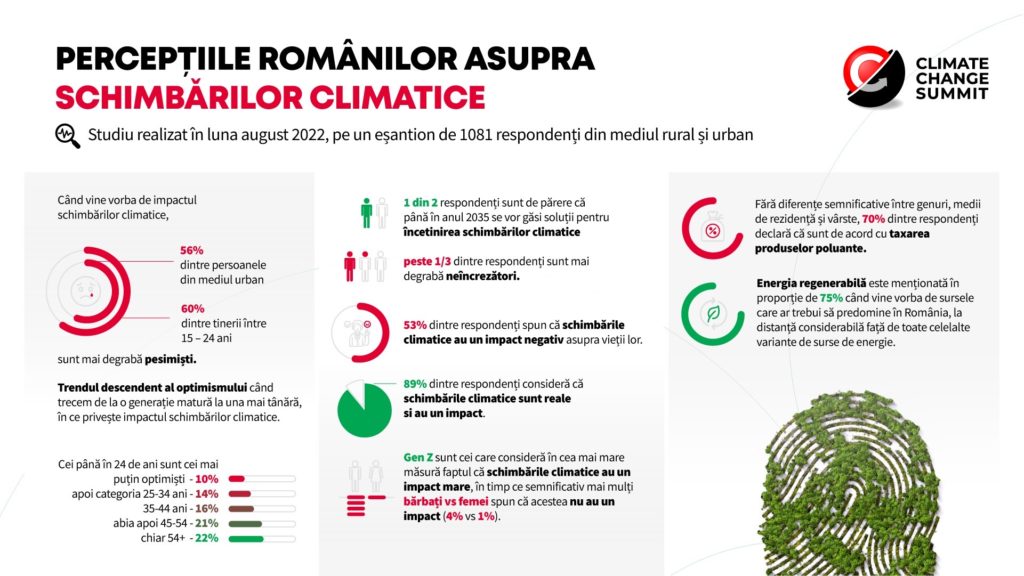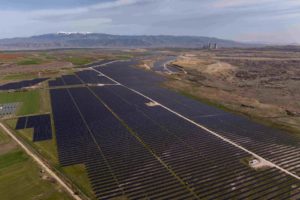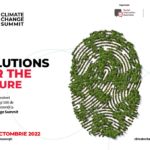75% of Romanians believe renewable energy sources should be prevalent, according to study conducted in preparation for the Climate Change Summit

- The youths of Generation Z are the most aware of the impending negative impact brought by climate change: 60%, by far the largest acknowledgement among the generations inquired
- In contrast to a previous study from 2021, Romanians now value environmentally friendly practices more (79%, as opposed to 64% in 2021) and are in favor of imposing an extra tax on polluting products
- The full study can be found here socialinnovationsolutions.org
How has Romanians’ perspective on climate change shifted? That is the focal point of the “Romanian perspective on the impact brought by climate change” study, released by Social Innovation Solutions (SIS), an organization active in sustainability, social impact and innovation. The study, concluded in August of 2022, with a pool of 1081 subjects, represents a follow up on the research made in 2021 by the IZI Data agency for Social Innovation Solutions.
This year’s analysis was developed surrounding the Climate Change Summit event, launched by BRD Groupe Société Générale as part of Lumea9 (New World), a sustainability platform that encompasses all the areas the bank considers to be important in building a better future.

The study is the first on the Climate Change Summit agenda, the most important event throughout Eastern and Central Europe dedicated to solutions for combatting climate change. The Summit will take place on the 4th and 5th of October at the Odeon Theater, in Bucharest, at the initiative and with support from BRD Groupe Société Générale.
One of the main conclusions of the research is that young people with ages ranging from 15 to 24 years old are more aware of the impact of climate change and have a more pessimistic perspective than other generations who rate their optimism between 50% (older than 54) and 52% (25-54 years old). Such a gap can also be observed when rating pessimism among respondents from urban areas (56%) and rural areas (49%). When it comes to those born in Generation Z, the optimism rate is as low as 10%, followed by Millennials, aged 24-34 (14%) and 35-44 (16%), Generation X, aged 45-54 (21%) and Baby Boomers, over 55 years old (22%).
When asked which frame of mind they wish would be prevalent amongst Romanians in 2035, 79% of the research participants prioritized environmentally friendly practices, marking an increase from the 2021 study (64%). However, empathy has been invoked by fewer respondents (29%) compared to last year (35%), with similar shifts observed when it comes to diversity (29%, compared to 35% in 2021), honesty (41%, from 48%), initiative (25%, from 31%) and ambition (16%, from 31% in 2021).
“We are living through a historical time, when crises never seem to stop coming. Starting with the pandemic, war and energy shortages and ending with the most complicated crisis of today’s and tomorrow’s generations: climate change. The second edition of the SIS study on the Romanian perspective on this crisis shows us that the Romanian people, from urban and rural areas, understand the gravity and urgency of finding solutions. We are happy to see that the most important mindset of the future is being environmentally friendly, which alongside other results consolidates our belief that we can create a momentum of solutions. The Climate Change Summit brings together experts, authority representatives and entrepreneurs from over 20 countries to map, develop and finance solutions for the future”, declared Ciprian Stănescu, President and CEO, Social Innovations Solutions.
“We have yet another proof of the younger generations’ interest towards climate change and its impacts on the environment and their future and towards the transition to a responsible economy, better adapted to the needs of the people and the planet. The research outcomes also show a greater need for stability and predictability. This is a natural consequence of the hurdles we have all faced these past few years. There are numerous challenges for which we are determined to find sustainable solutions within The Climate Change Summit – solutions that we will bring to life together”, added Flavia Popa, Secretary General, BRD Groupe Société Générale.
When it comes to solutions, more than half of the study’s respondents believe that by 2035 there will be ways to slow down climate change, a stark contrast to the 11% of the subjects in 2021 who were convinced it won’t come to it. Meanwhile, a third of the participants are distrustful. Furthermore, over 75% believe in the impact brought by climate change, while 23% believe there is little, or no impact whatsoever. Generation Z respondents are the most aware of the gravity of the climate change impact, while significantly more men (4%) than women (1%) do not believe in the consequences.
The negative impact on agriculture and air pollution are perceived as the worst effects of climate change, followed by rising temperatures, desertification and floods and only then loss of biodiversity, wildfires and rising sea levels. Significant gaps can be observed between women’s and men’s perception, women assigning 6-10% more importance to each consequence of climate change compared to men. A similar contrast can be seen between rural and urban areas, the latter assigning 2-8% more importance to the 8 individual climate change impacts. There are fewer respondents worried about each one of these effects this year, compared to 2021.
Those within the Young Millennials age group (25-34 years old) attribute the most importance to the negative consequences on agriculture, air pollution, desertification, floods and loss of biodiversity, marking an increase of 7-9% compared to other age groups. When asked about the impact numerous activities have on the environment, waste has been identified as the top answer, followed by product packaging methods. The textile industry has been perceived as the least dangerous to the environment. While the same ranking has been observed in the 2021 study, the perception of the effects caused by what were considered the most dangerous activities for the environment has decreased by 12% for waste and 8% for packaging.
Almost half of the respondents consider that the difficulty in reducing the effects of climate change is caused by the lack of strict enough policies which would be effective in changing people’s behavior. A third of the respondents pinpoint resistance to change as the reason when it comes to consumer behavior. Furthermore, according to the study, 63% of Romanians believe they are more involved in combatting climate change than the government or local authorities. One third of respondents named the absence of infrastructure as the top reason for the lack of selective waste management. The other cause, invoked by the same number of respondents, is people not knowing how to properly sort waste.
Although 51% of the people interviewed had no idea that Romania, according to the Paris agreement, has promised to cut down on the greenhouse emissions by 2050, they are willing to make sacrifices in order to protect the environment: without any significant gaps between groups in terms of gender, habitat space or age, the vast majority of Romanians (70%) declare they support additional taxation of polluting products.
Renewable energy is mentioned by 75% of the subjects when asked which form of energy should be prevalent in Romania, by far favored to any other potential energy source. Closely related to this mindset, the most invoked solution for reducing the effects of climate change has been increasing the renewable energy sources ratio, followed at a significant distance by lowering greenhouse emissions produced by cars and green investing in the private sector, both of which were named by half of the respondents.
Eco-friendly attitudes are the most popular answer among Romanians when asked what measures companies should adopt, followed by fair pay as an incentive for qualified personnel and health benefits, which are preferred especially by Young Millennials, aged 25-34 (68%, compared to the average 59% across all age groups). Generation Z, however, values more than other generations educational development through skill refinement courses (55% of those aged 15-24, compared to the average of 41% for all other age groups).
Among the other partners of the Climate Change Summit’s first edition are: Mastercard, as Sustainability Partner; Auchan Retail partners, Société Générale Global Solutions Center, Enel and Mercedes-Benz as official car; the General Secretariat of the Romanian Government as strategic partner; organizational partners Concordia Employers’ Confederation; Romanian Business Leaders; WWF Romania; EPG; GEYC; EfdeN; Văcărești Natural Park Association (VNPA); CONAF; Circular Economy Coalition (CERC); The Bilateral Greek-Romanian Chamber of Commerce (HRCC); The Romanian Youth Council; CCIFER, Envisia, The European Institute in Romania; ECOIND, BRCC, CCIFER, The Sustainability Embassy, The Commitment to the Environment (Angajament pentru Mediu)c, Carbon Expert, content partners InfoClima.ro, Solutions and Frame Advertising and media partners Hotnews, The Diplomat, Sustainability Today and CEE Energy News.
About Social Innovation Solutions
The mission of Social Innovation Solutions (SIS) is to support individuals and organizations in understanding the transformations of the future and developing sustainable technologies, public and entrepreneurial policy solutions. SIS organizes several incubators and accelerators in Romania and Central and Eastern Europe, working with over 100 start-ups every year. SIS is also developing several platforms for conversations about sustainability, future trends and circular economy such as Future Summit, Sustainable Futures sau Climate Change Summit and offers consultancy and executive education programs for learning foresight, innovation and sustainability.
About BRD – Groupe Société Générale
BRD Groupe Société Générale is one of the leaders of the Romanian banking market. The bank operates a network of 499 branches, with total assets amounting at RON 71Bn as of March 31st, 2022. BRD holds a leading position in the retail banking market, is a top player in the corporate banking market and the leader of the Romanian factoring market.
BRD is part of Société Générale Group, one of the leading European financial services groups. The Group has over 131,000 members of staff in 66 countries and supports on a daily basis 26 million individual clients, businesses and institutional investors around the world by offering a wide range of advisory services and tailored financial solutions.
As a social actor, BRD invests in culture, education, technology and sports, supporting projects that build, develop and grow a new generation, bringing forth long term value. This is the vision that created Fundația9, which coordinates the cultural journalism platform Scena9, as well as the cultural center Rezidenta9 in Bucharest. For education, BRD created Școala9, a specialized journalism platform, and lends aid to programs that support the efforts of teachers in the formal education system, as well as plans, ideas and projects in the fields of tech and innovation. The newest journalism platform launched by BRD is Mindcraft Stories, which aims at starting a conversation about discoveries in Romania and throughout the world regarding how technology affects our lives, touching upon artificial intelligence, robotics, medicine and much more.














